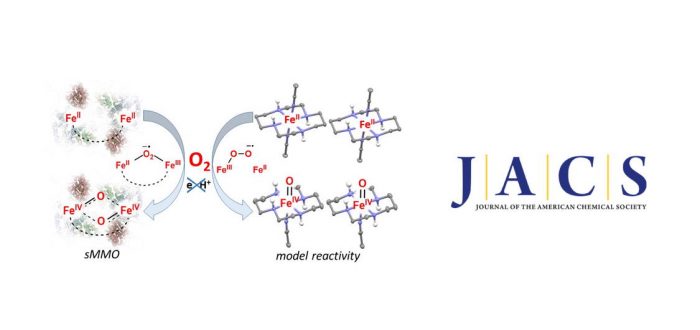In soluble methane monooxygenase enzymes (sMMO) dioxygen (O2) is activated at a diiron(II) center to form an oxodiiron(IV) intermediate Q that performs the challenging oxidation of methane to methanol. An analogous mechanism of O2 activation at mono- or di-nuclear iron centres is rare in the synthetic chemistry. Herein, we report a mononuclear non-heme iron(II)-cyclam complex
- sec.iqcc@udg.edu
- +34 972 41 83 57
Category: Marcel Swart news
The IQCC was created in 1993 (as IQC, focusing only on computational chemistry), and was joined in 2013 by two experimental groups (QBIS, METSO) because of long-standing collaborations and mutual interests. Right now, in this vibrant community of highly motivated researchers that are working on predictive catalysis both at lab benches and through molecular modelling, we
Soluble methane monooxygenase (sMMO) carries out methane oxidation at 4 °C and under ambient pressure in a catalytic cycle involving the formation of a peroxodiiron(III) intermediate (P) from the oxygenation of the diiron(II) enzyme and its subsequent conversion to Q, the diiron(IV) oxidant that hydroxylates methane. Synthetic diiron(IV) complexes that can serve as models for
The incarceration of o?benzyne and 27 other guest molecules within hemicarcerand 1, as reported experimentally by Warmuth, and Cram and co?workers, has been studied by density functional theory (DFT). The 1H-NMR chemical shifts, rotational mobility, and conformational preference of the guests within the supramolecular cage were determined, which showed intriguing correlations of the chemical shifts
We report here a computational study on a series of FeII, FeIII, and FeIV hydroxo/oxoiron complexes with a broad palette of ligands. We are interested in assessing the robustness of widely used density functionals for their prediction and description of structures and spin states for the examined oxoiron complexes. We have used a variety of density
Prof. Marcel Swart, director of the IQCC since 2015, was recently elected as member of Academia Europaea and received yesterday the corresponding decorations. The Academia Europaea is a pan-European Academy founded in 1988 and is composed of individual scientists and scholars from all disciplines, who are experts and leaders in their own subject areas as
After having won last year three times the poster prize at different conferences (Girona, Berlin, Liverpool), this week Lorenzo D’Amore won the Poster Prize at QBIC-V in Marseille. Congratulations Lorenzo!!!!
We report a combined experimental–theoretical study on the 31P NMR chemical shift for a number of trans-platinum(II) complexes. Validity and reliability of the 31P NMR chemical shift calculations are examined by comparing with the experimental data. A successful computational protocol for the accurate prediction of the 31P NMR chemical shifts was established for trans-[PtCl2(dma)PPh3] (dma
Although the unusual structural, magnetic, electronic, and spin characteristics of manganocene has intrigued scientists for decades, a unified explanation and rationalization of its properties has not yet been provided. Results obtained by Multideterminantal Density Functional Theory (MD-DFT), Energy Decomposition Analysis (EDA), and Intrinsic Distortion Path (IDP) methodologies indicate how this uniqueness can be traced back
Since 2015 the IQCC is organizing a Science Slam (first, second, third edition). Next week on Monday May 13 the IQCC organizes the fourth edition to show the most representative research projects of the Institute to a wide audience. The research carried out within each of the research teams of the IQCC will be briefly summarized by the PIs










